
BIOLOGIA
metrics 2024
Empowering the academic community with impactful findings.
Introduction
BIOLOGIA, a distinguished journal published by Springer, serves as a pivotal resource in the fields of biological sciences, including Animal Science, Zoology, Plant Science, Ecology, Evolution, Behavior, Cell Biology, Biochemistry, and Genetics. Established in 1954 and continuously disseminating knowledge through its converged years until 2024, it supports the academic community by fostering effective communication amongst researchers and professionals. Notably, the journal boasts a commendable presence in academic rankings, holding a Q2 ranking in Animal Science and Zoology, along with Q3 designations in multiple disciplines, reflecting its substantial impact in enhancing scientific inquiry. While currently not offering open access, the journal remains a critical tool for those seeking to stay at the forefront of biological research, supported by its robust publication framework. For students, researchers, and professionals alike, BIOLOGIA is an essential reference for innovative studies and findings that drive the field forward.
Metrics 2024
 0.36
0.36 1.40
1.40 1.40
1.40 50
50Metrics History
Rank 2024
Scopus
IF (Web Of Science)
JCI (Web Of Science)
Quartile History
Similar Journals

Biology-Basel
Unleashing Insights in Molecular and Immunological SciencesBiology-Basel is a premier, peer-reviewed open-access journal published by MDPI since 2012, situated in the heart of Switzerland. With an E-ISSN of 2079-7737, this journal serves as a vital platform for the dissemination of innovative research across the broad spectrum of Agricultural and Biological Sciences, Biochemistry, Genetics, Molecular Biology, and Immunology. Recognized for its rigorous editorial standards and impactful findings, it currently ranks Q1 in Agricultural and Biological Sciences and holds impressive positions in several categories according to the 2023 Scopus rankings. The journal’s open-access model ensures that high-quality research is freely available to a global audience, fostering collaboration and knowledge sharing among researchers, professionals, and students alike. Spanning from 2012 to 2024, Biology-Basel is committed to reflecting the latest advancements in biological sciences, making it an essential resource in the ever-evolving landscape of biological research.
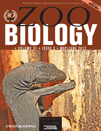
ZOO BIOLOGY
Illuminating the path of zoological discovery since 1982.ZOO BIOLOGY, published by Wiley, serves as an essential academic journal in the fields of animal science and zoology. With a notable ISSN of 0733-3188 and an E-ISSN of 1098-2361, the journal has been a cornerstone of wildlife research and conservation since its inception in 1982. Spanning research contributions up to 2024, ZOO BIOLOGY holds an impressive reputation, ranked in the Q2 category for Animal Science and Zoology and Q3 in miscellaneous Medicine, reflecting its significant influence and scholarly impact. With a Scopus rank of #188 out of 490 in Agricultural and Biological Sciences, the journal maintains a strong position in the 61st percentile, showcasing the high-quality research it publishes. Although it does not offer open access, ZOO BIOLOGY provides valuable insights and advancements in the biological sciences, making it an indispensable resource for researchers, professionals, and students dedicated to advancing zoological science and animal biology.
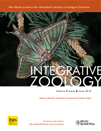
Integrative Zoology
Integrating Knowledge for Conservation SuccessIntegrative Zoology is a distinguished journal published by WILEY, focusing on advancing the field of zoological sciences through the integration of various biological disciplines. With both ISSN 1749-4877 and E-ISSN 1749-4869 identifiers, this journal features research that fosters a deeper understanding of animal biology, ecology, and conservation strategies. As a testament to its impact, Integrative Zoology is recognized within the Q1 category of Animal Science and Zoology in 2023, ranking an impressive #27 out of 490 journals in its field, placing it in the 94th percentile among peers. Published in the United Kingdom, this journal not only serves as a critical platform for novel research but also engages a global audience, inviting submissions that bridge theoretical and practical aspects of zoology. While not entirely open access, the journal remains committed to disseminating high-quality research that contributes substantially to scientific advancements. Through its continuous publication since 2008, Integrative Zoology aims to inspire researchers, educators, and students alike, making it a cornerstone for anyone passionate about the complexities of animal life.
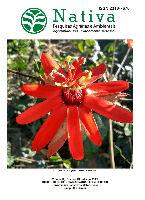
Nativa
Empowering global research for a greener future.Nativa, published by the Universidade Federal de Mato Grosso in Brazil, stands as a prominent open-access journal since 2013, dedicated to the dissemination of research across various domains of Agricultural and Biological Sciences. With its ISSN 2318-7670, Nativa aims to foster scholarly communication and collaboration among researchers and practitioners worldwide. The journal occupies notable positions within the Scopus rankings, with a Q3 classification in several categories, including Agricultural and Biological Sciences (miscellaneous) and Environmental Science (miscellaneous), while also holding a Q4 classification in areas such as Agronomy and Crop Science and Animal Science and Zoology. This positioning reflects its commitment to advancing knowledge and understanding crucial to sustaining and enhancing our natural resources. Nativa seeks to engage a diverse readership by providing a platform for innovative research, fostering interdisciplinary discourse, and addressing pressing environmental challenges and conservation efforts essential for sustainable development.

AEROBIOLOGIA
Unveiling the Impact of Airborne Biology on Health and BiodiversityAEROBIOLOGIA is an esteemed journal published by SPRINGER, dedicated to the dynamic fields of Immunology, Allergy, and Plant Science. With a history of scholarly contributions dating back to 1985, this journal serves as a critical platform for researchers and professionals to share advancements and findings in the understanding of airborne biological particles and their implications on health and biodiversity. As evidenced by its Q2 and Q3 quartile rankings in various categories as of 2023, AEROBIOLOGIA holds a significant position within the academic community, particularly in the realms of Agricultural and Biological Sciences. The journal encourages high-quality submissions and remains committed to fostering innovation and collaboration among scientists dedicated to the exploration of aerobiological phenomena. While it is not an open-access publication, its rich repository of research is crucial for academia and industry practitioners alike, facilitating essential insights into ecological interactions and immunological responses.
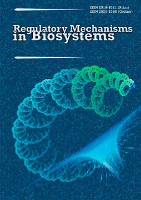
Regulatory Mechanisms in Biosystems
Illuminating the Pathways of Molecular BiologyRegulatory Mechanisms in Biosystems (ISSN: 2519-8521, E-ISSN: 2520-2588) is an esteemed open-access journal published by the OLES HONCHAR DNIPROPETROVSK NATIONAL UNIVERSITY in Ukraine. Since its establishment in 2017, the journal has been dedicated to advancing knowledge in the dynamic fields of biochemistry, genetics, molecular biology, as well as relevant interdisciplinary domains. Although it currently holds a Q4 ranking across multiple categories—including Biochemistry, Microbiology, and Pharmacology—it provides a vital platform for researchers and professionals to disseminate innovative findings and insights. With a commitment to fostering collaboration and dialogue within the scientific community, Regulatory Mechanisms in Biosystems plays a crucial role in promoting open access research that contributes to our understanding of complex biological systems, ultimately guiding evidence-based practices in health and environmental sciences. The journal invites scholars to submit diverse articles covering both theoretical and empirical studies that reflect the multifaceted nature of regulatory mechanisms in biological systems.
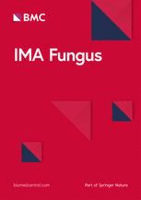
IMA Fungus
Exploring the Intricacies of Fungi and Ecosystems.IMA Fungus is an esteemed open-access journal published by BMC, dedicated to advancing research in the fields of fungi, plant sciences, and ecological systems. With an ISSN of 2210-6340 and E-ISSN 2210-6359, this journal has been an influential platform since its inception in 2010, contributing significantly to the scientific community in the United States and beyond. The journal’s remarkable impact can be seen in its Q1 quartile rankings across multiple categories, including Agricultural and Biological Sciences, Ecology, Evolution, Behavior and Systematics, and Plant Science, positioning it among the top literary sources in these fields. Notably, IMA Fungus holds impressive Scopus rankings, with the Agricultural and Biological Sciences category placing it in the 98th percentile, evidencing its crucial role in disseminating impactful research. Given its commitment to fostering accessibility and collaboration, IMA Fungus continues to be an invaluable resource for researchers, professionals, and students aiming to explore and understand the complex roles of fungi within various ecosystems.

Botany
Elevating understanding in the world of botany.Botany is a premier academic journal published by Canadian Science Publishing, dedicated to advancing the understanding of plant sciences and ecological systems. With an ISSN of 1916-2790 and an E-ISSN of 1916-2804, this journal has established itself as a respected publication in the fields of Ecology, Evolution, Behavior and Systematics, and Plant Science, reflected in its 2023 Q2 and Q3 rankings. Covering a wide range of topics, Botany is committed to fostering interdisciplinary research, promoting innovative methodologies, and disseminating significant findings from both theoretical and applied perspectives. Based in Ottawa, Canada, the journal is open access, ensuring that high-quality research is accessible to a global audience, thereby playing a crucial role in the dissemination of knowledge in the scientific community. With convergence years from 2008 to 2024, it continues to evolve alongside the scientific advancements in botanical studies, making it an essential resource for researchers, professionals, and students alike.

Applied Biological Research
Elevating Academic Discourse in Biochemistry and GeneticsApplied Biological Research is a dynamic journal issued by the CENTRE ADVANCEMENT APPLIED SCIENCES, specializing in the interdisciplinary fields of biochemistry, genetics, and molecular biology. With its ISSN 0972-0979 and E-ISSN 0974-4517, this journal serves as a critical platform for the dissemination of peer-reviewed research that addresses pressing challenges and innovations within biological sciences. Although currently it does not adopt an Open Access model, it is dedicated to fostering academic discourse through rigorous publication practices. The journal's impact is underscored by its Scopus rankings, which place it in the 4th and 2nd percentiles in respective categories, emphasizing its emerging influence in the scientific community. Covering research from 2020 to 2024, Applied Biological Research is positioned as an essential read for researchers, professionals, and students seeking to stay at the forefront of biological research and application. Based in the beautiful region of Jammu & Kashmir, India, this journal is committed to advancing applied sciences through innovative research and outreach.
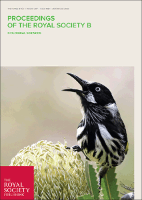
PROCEEDINGS OF THE ROYAL SOCIETY B-BIOLOGICAL SCIENCES
Pioneering Research for a Sustainable FuturePROCEEDINGS OF THE ROYAL SOCIETY B-BIOLOGICAL SCIENCES, published by the esteemed Royal Society, stands as a premier platform for disseminating cutting-edge research in the fields of Biological Sciences. With an impressive impact factor reflective of its high citation rates and scholarly contributions, this journal encompasses a wide array of disciplines, including Agricultural and Biological Sciences, Biochemistry, Genetics and Molecular Biology, Environmental Science, and Immunology and Microbiology, consistently ranking in the Q1 category across these fields. Since its inception in 1946, it has been committed to advancing our understanding of biological systems and informing evidence-based practices. Researchers and academics can submit their work without the Open Access barrier, thereby maintaining the integrity of the disciplinary discourse while providing comprehensive insights. The journal's location in the United Kingdom also positions it at the heart of global scientific innovation, making it a vital resource for professionals and students alike who are eager to explore the latest trends and breakthroughs in the biological sciences.